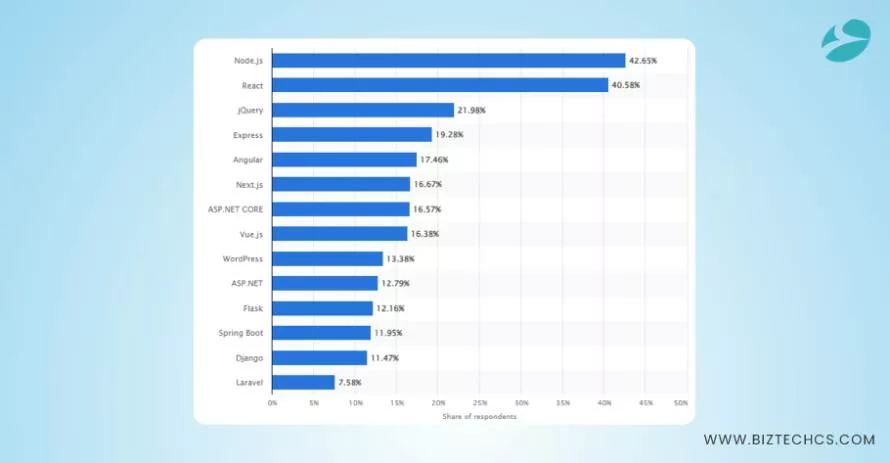
https://www.biztechcs.com/blog/enhance-healthcare-management-with-angular/
Summary
Technology emerges as a beacon of hope for streamlining operations, improving patient care, and enhancing overall efficiency.
Healthcare management is an intricate web of appointments, patient records, billing, and crucial decision-making. The demands of this sector are ever-increasing, necessitating innovative solutions that can keep pace with the dynamic landscape.
With Angular’s extensive capabilities, healthcare professionals can elevate patient care and treat more patients in time. From streamlined doctor-patient appointments to accurate diagnosis and treatment and even teleconsultation, Angular web apps can help with all.
In this exploration, we will dissect the unique challenges faced in healthcare management, from patient care coordination to data security. We’ll also uncover the myriad benefits of Angular, unveiling its potential as the driving force behind a new wave of healthcare applications.
Whether you’re a healthcare professional seeking innovative solutions or a developer looking to make a meaningful impact, join us on this exciting journey towards a future where technology and healthcare seamlessly converge to enhance patient care and streamline healthcare management.
Whether you apply these on your own or hire angular developers, these tips should help you create an impactful healthcare management solution.
Notable Healthcare Management Challenges
- Patient Data Management: Healthcare organizations deal with vast amounts of patient data, including medical records, test results, and treatment plans. Managing, accessing, and updating this data efficiently is challenging.
In this day and age, no one relies on papered documents and manages records digitally. However, the need for a robust data management system can’t be denied as issues like system downtime, data redundancy, server error, etc. have become quite common.
- Appointment Scheduling: Efficiently scheduling and managing patient appointments while considering various parameters like doctor availability and patient preferences can be complex. The process gets even more complex for a large hospital where multiple healthcare professionals work. Having robust Healthcare management systems helps in that case.
- Billing and Insurance Claims: Billing and insurance claims processing involves complex workflows, including verification and submission. Errors can lead to delayed payments and revenue loss.
With a multitude of insurance policies from varied companies, you also have to abide by different rules and regulations for each policy for verification. Therefore, the need for an accurate healthcare management program is quite high.
- Patient Engagement: Engaging patients in their healthcare journey, encouraging adherence to treatment plans, and providing access to educational resources can be challenging. Oftentimes, there are misinterpretations and patients may face difficulty understanding what the doctor has instructed. Having a dedicated portal with easy access to all this information is beneficial to both patients as well as doctors.
Benefits of Developing an Angular Web App for Healthcare Management

Image SourceAngular is a highly popular JavaScript framework that has gained significant traction in the world of web development due to its numerous advantages. A Statista 2023 report showed Angular to be the 5th most popular web framework among developers.
This versatile framework, developed and maintained by Google, offers a myriad of reasons why it is chosen by developers for building robust and dynamic web applications. From its powerful data binding capabilities to its extensive library of ready-to-use components, Angular enables developers to create complex applications with ease.
- User-Friendly Interface: Angular’s declarative templates and data binding simplify the creation of user-friendly interfaces. This is essential in healthcare management where intuitive interfaces are crucial for efficient data entry and retrieval, reducing the risk of errors.
- Real-Time Updates: Accessing real-time data is essential in any healthcare management system. Angular’s two-way data binding makes sure healthcare professionals have quick access to patient data, test results, schedule changes, etc., aiding in informed decision-making.
- Cross-Platform Compatibility: Healthcare professionals seek accessibility in their healthcare management programs so they can access it on any device. Angular’s web applications are highly responsive in this matter and enable you to access the web app across various devices and screen sizes such as desktops, laptops, and tablets.
- Modularity and Reusability: Angular modularization architecture promotes code organization and reusability. This is valuable in healthcare management, where various modules can be developed and reused for different aspects such as patient records, appointment scheduling, and billing.
- Native-App-Like Experience with SPA: Undoubtedly, usability stands as a paramount concern in every project, significantly impacting how favorably the system is assessed by its users. Single Page Applications enable us to provide users with an experience akin to native applications. These apps excel in their capacity to refresh specific segments of the user interface without the need for server roundtrips to fetch HTML content.
Thus, the waiting time for reloading pages is minimized and content on your webpage is updated dynamically. The single-page architecture helps elevate user experience, build advanced functionalities for your app, enhance SEO capabilities with Angular Universal, and develop apps with offline capabilities.
- Performance Optimization: Angular offers tools for optimizing app performance, ensuring fast loading times and smooth user experiences. Healthcare professionals can access patient data and perform tasks efficiently, even in complex healthcare environments.
- Highly Scalable: Healthcare organizations can scale their Angular web apps to accommodate growing user bases, additional features, and increased data volume. This scalability ensures that the web app can adapt to evolving healthcare needs should the need arise.
- Integration Capabilities: Angular can easily integrate with other technologies and APIs. This enables healthcare organizations to connect their web apps with existing healthcare systems, third-party services, and data sources, promoting interoperability. Healthcare systems can also make use of integration to improve their social media presence and reach a wider audience.
- Improved Patient Engagement: Angular web apps can empower patients by providing access to their health information, appointment scheduling, and educational resources. This fosters patient engagement, adherence to treatment plans, and improved overall healthcare outcomes.
- Streamlined Workflows: Angular web apps can be tailored to automate and streamline various healthcare management processes, such as billing, insurance claims processing, and appointment management. This reduces administrative burdens and enhances operational efficiency. You can save many manual hours by automating the tasks digitally.
Types of Healthcare Management Web Apps You Can Build Using Angular
Healthcare Management Web apps encompass a wide range of applications designed to address various aspects of healthcare administration, patient care, and medical practice management. Here are different types of healthcare management web apps:
- EHR Systems: Electronic Health Record Systems enable you to digitize patient records. You get a centralized system to update patient information, past medical history, diagnosis, and recommended treatment and access it anytime.
- Practice Management Software: It helps with the management of administrative tasks such as appointment scheduling, billing, insurance claims processing, and patient communication. Your staff can schedule appointments seamlessly by checking doctor availability, generating and processing bills and invoices quickly, and communicating with patients to address their queries and concerns almost instantly.
You can also get a dedicated patient module which helps patients communicate securely with healthcare providers. They can access their medical records, schedule appointments, and request prescription refills.
- Telemedicine Web Application: For patients residing in a remote location or not capable of commuting to the hospital, telemedicine web apps enable remote consultations between healthcare providers and patients. They include features for video conferencing, secure messaging, and the exchange of medical records.
- Medical Billing and Revenue Cycle Management: These apps focus on medical billing processes, helping healthcare organizations submit claims, process payments, and manage revenue cycles efficiently. They often integrate with insurance companies and billing codes.
- Pharmacy Management System: Pharmacy management web apps assist pharmacists in dispensing medications, managing inventory, and processing prescription orders. They may include features for medication interaction checks and patient education. Pharmacists can also build an online medicine ordering system to let patients order medicines online through the app.
As evident, there are multiple types of healthcare management apps available. You can choose to build one as per your need.
Now, let’s look at the various features to improve the performance of your Angular web apps! Use these tips to improve Angular performance and elevate healthcare management.
Improve Healthcare Management With These Angular Web App Features
Improving healthcare management with Angular web apps involves incorporating features that streamline processes, enhance patient care, and ensure compliance with regulatory requirements. Here are some essential Angular web app features to achieve these goals:
- EHR Integration: Integrate EHR systems seamlessly to provide healthcare professionals with easy access to patient records, medical histories, and treatment plans within the web app. It helps with administrative tasks of recordkeeping, helping your staff stay productive. You will have to deal with less paperwork and even hire fewer resources to get the job done (thanks to automation!), saving operational costs.
- Online Appointment Scheduling: Implement a robust appointment scheduling module that allows patients to book appointments online, check physician availability, and receive appointment reminders.
- Telemedicine Capabilities: Enable secure video conferencing, telehealth consultations, and virtual visits for remote patient care, leveraging Angular’s real-time communication capabilities.
- Patient Portals: Develop a dedicated patient portal for your web app with personalized dashboards where patients can access medical records, lab results, appointment histories, and securely communicate with healthcare providers. You can also design a self-help portal for patients where they can be a part of the healthcare community, learn various tips and remedies to take care of their help and engage with other community members.
- Billing and Claim Management: Incorporate billing and claims management features to streamline the billing process, track claims status, and generate invoices while adhering to healthcare billing standards.
- Prescription and Medication Management: Facilitate prescription orders, refill requests, and medication management, including medication reminders and interaction checks.
- Data Analytics and Reporting: Develop advanced analytics and reporting tools to help healthcare organizations gain insights from patient data, monitor key performance indicators, and track healthcare outcomes. You can also integrate third-party applications for analytics and reporting if you don’t custom-create this feature.
- Integration with Medical Devices: You can integrate the healthcare web app with wearables and medical devices so that it is easier to collect health data of patients. It is for easier monitoring of a patient’s health vitals and automating data updates within EHR.
- Offline Access: Implement offline access capabilities for healthcare professionals working in areas with limited or unstable internet connectivity. It ensures uninterrupted connectivity and healthcare facilities for patients.
- Scalability and Performance Optimization: Ensure that the web app can handle increased user loads and data volumes, providing consistent performance and responsiveness. Leverage various Angular 17 features like deferrable views to achieve faster loading times, improving the speed and performance of your application.
Additional Tips to Enhance Healthcare Management With Angular Web Apps
- Mobile Accessibility: Create a mobile-responsive design for healthcare professionals and patients to access critical information and features on smartphones and tablets. Make sure your app is accessible and easy to use by all, patients and healthcare professionals alike.
- Security Measures: Incorporate robust security features, including encryption, access controls, audit logs, and regular security audits, to protect patient data and ensure compliance with data privacy regulations.
- Interoperability: Enable interoperability by integrating with other healthcare systems, labs, and external data sources to exchange patient information seamlessly.
- Multi-Language Support: Offer multi-language support to ensure that healthcare services are accessible to patients from diverse linguistic backgrounds.
- Compliance Tracking and Auditing: Incorporate features to track and audit compliance with healthcare regulations, enabling healthcare organizations to maintain regulatory standards.
By incorporating these Angular web app features, healthcare management can be significantly improved, leading to enhanced patient care, streamlined operations, and better adherence to industry regulations.
Do you want to deliver seamless Healthcare management services to your patient as well? Then, our Angular team can help you out in this venture. Having worked on 1200+ projects, Biztech is fit for the robust and secure development of Healthcare Angular web apps.
Connect with our team today for consultation and quote!
Conclusion
Harnessing the power of Angular web apps in healthcare management is not just a technological advancement; it’s a transformative journey that can redefine the way a healthcare management company operates. The features and capabilities we’ve explored in this guide pave the way for a future where healthcare management is efficient, patient-centric, and compliant with the highest industry standards.
By embracing Angular web apps, healthcare management companies can streamline administrative processes, improve patient care, and ensure data security—all within a user-friendly and scalable digital ecosystem.
As we navigate the ever-evolving landscape of healthcare, let Angular be your trusted ally in delivering the highest quality of care, optimizing resource allocation, and achieving compliance with healthcare regulations. The journey to enhancing healthcare management has never been more promising, and the possibilities are boundless for healthcare management companies that embrace this transformative technology.
2974
30 Nov, 2023
5 min read
2974
30 Nov, 2023
5 min read


100

415

1036